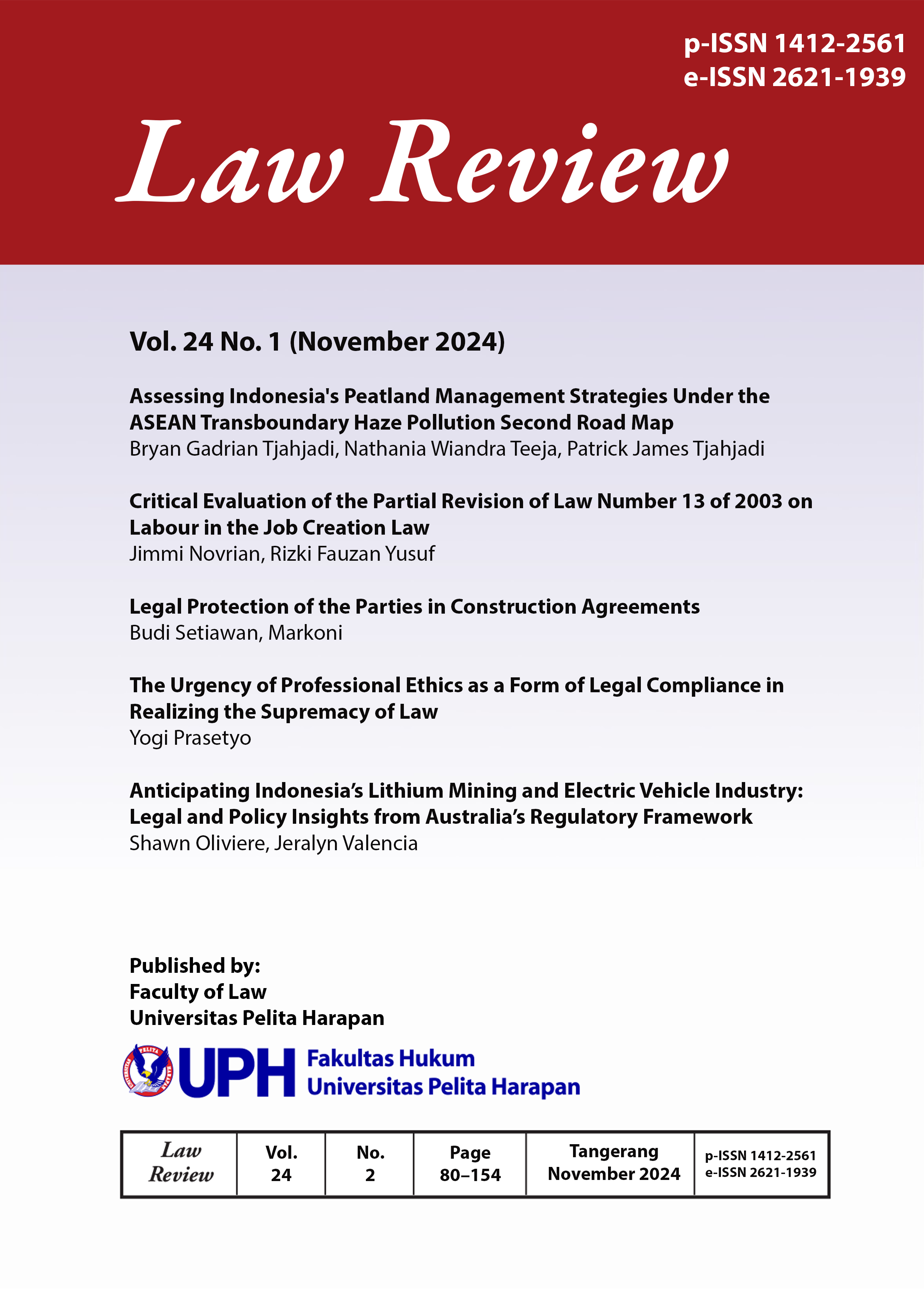Legal Protection of the Parties in Construction Agreements
DOI:
https://doi.org/10.19166/lr.v24i2.7784Kata Kunci:
Construction Agreements, Legal Protection, Construction LawAbstrak
Construction agreements in Indonesia are an important legal instrument that often faces challenges due to the complexity of regulations and the potential imbalance of power between parties. This study aims to analyze the legal framework governing construction agreements in Indonesia and identify the importance of dispute resolution in the context of construction projects. This research uses a literature study to analyze the legal framework governing construction agreements, including the Civil Code, Law Number 2 of 2017 on Construction Services and Government Regulation Number 17 of 2013. This analysis reveals the importance of dispute resolution, especially through arbitration, as an effective mechanism to address conflicts in construction projects. The role of legal consultants with expertise in construction law is also crucial in guiding stakeholders in drafting agreements that protect the interests of each party and minimize legal risks. This study emphasizes the need for careful attention to legal protection in construction agreements to ensure fairness and the success of the project.
Referensi
Journal Articles
Aloisi, Antonio. “Platform Work in Europe: Lessons Learned, Legal Developments and Challenges Ahead.” European Labour Law Journal 13, no. 1 (2022): 4–29. https://doi.org/10.1177/20319525211062557.
Alshihri, Saad, Khalid Al‐Gahtani, and Abdulmohsen Almohsen. “Risk Factors That Lead to Time and Cost Overruns of Building Projects in Saudi Arabia.” Buildings 12, no. 7 (2022). https://doi.org/10.3390/buildings12070902.
Castañer, Xavier, and Nuno Oliveira. “Collaboration, Coordination, and Cooperation Among Organizations: Establishing the Distinctive Meanings of These Terms Through a Systematic Literature Review.” Journal of Management 46, no. 6 (2020): 965–1001.https://doi.org/10.1177/0149206320901565.
Devaney, Sarah. “Justice for All? Impeding the Villainization of Human Trafficking Victims via the Expansion of Vacatur Laws.” Pepperdine Law Review 49, no. 1 (2021): 1.
Ferrara, Alessandro. “Moral Duties and Juridical Duties: The Ambiguity of Legal Ethics Considered Through the Prism of Kant’s Metaphysics of Morals.” German Law Journal 23, no. 1 (2022): 117–29. https://doi.org/10.1017/glj.2022.5.
Forsyth, Anthony, Tess Hardy, and Shae McCrystal. “Collective Bargaining in Fissured Work Contexts: An Analysis of Core Challenges and Novel Experiments.” Federal Law Review 51, no. 4 (2023): 509–32. https://doi.org/10.1177/0067205X231205051.
Hermawan, Anis W. “Improving Tax Compliance of the Construction Sector in Indonesia: A Juridical Perspective.” Scientia Business Law Review 1, no. 2 (2022): 1–6.
Huhta, Kaisa, and Seita Romppanen. “Comparing Legal Disciplines as an Approach to Understanding the Role of Law in Decarbonizing Societies.” Transnational Environmental Law 3 (2023): 649–70. https://doi.org/10.1017/S204710252300016X.
Ljupcho, Simona, Mo Naumovska, Ljupcho Naumovski, and Simona Naumovska. “ASEAN Journal of Community Volunteerism in Civil Society: The World Experience and the Media.” ASEAN Journal of Community Engagement 6, no. 1 (2022): 98–125.
Mirzaee, Ali Mohammad, M. Reza Hosseini, Igor Martek, Payam Rahnamayiezekavat, and Mehrdad Arashpour. “Mitigation of Contractual Breaches in International Construction Joint Ventures under Conditions of Absent Legal Recourse: Case Studies from Iran.” Engineering, Construction & Architectural Management 30, no. 4 (2023): 1481–95. https://doi.org/10.1108/ECAM-08-2021-0751.
Mythen, Gabe, and Samantha Weston. “Interrogating the Deployment of ‘Risk’ and ‘Vulnerability’ in the Context of Early Intervention Initiatives to Prevent Child Sexual Exploitation.” Health, Risk & Society 25, no. 1–2 (2023): 9–27. https://doi.org/10.1080/13698575.2022.2150750.
Nugroho, Eko Rial, Mahrus Ali, Rohidin, Jawahir Thontowi, and Karimatul Ummah. “Framing the Covid-19 Pandemic as a Force Majeure Clause to Escape Debtor’s Liability.” International Journal of Law & Political Studies 5, no. 1 (2023): 16–21. https://doi.org/10.32996/ijlps.2023.5.1.3.
Nurhayati, Yati, Mohd Zamre Mohd Zahir, Muhammad Hatta, Muhammad Hendri Yanova, and Parman Komarudin. “Breach of Contract: A Comparison Between Indonesian and Malaysian Contract Law.” International Journal of Law, Environment & Natural Resources 2, no. 1 (2022): 33–45. https://doi.org/10.51749/injurlens.v2i1.21.
Prabowo, Bagya Agung, and Nurjihad. “The Legal Interpretation of the State of Musytari’s Force Majeure on the Murabahah: Financing Contract Post Presidential Decree No. 12 of 2020.” International Journal of Law & Political Studies 5, no. 1 (2023): 46–54. https://doi.org/10.32996/ijlps.2023.5.1.6.
Sulmarty, and Moh. Saleh. “Legal Consequences of Breach in Investment Agreements without Notary Deed Based on Islamic Law Perspective.” Mizan: Journal of Islamic Law 6, no. 3 (2022): 349–462.
Tang, Bingsong, and Nan Li. “Contractual Governance for Dispute Resolution and Construction Sustainability: Case Studies from China.” Sustainability 14, no. 13 (2022). https://doi.org/10.3390/su14137643.
Thibault, Louis Tremblay, Tom Sarry, and Abdelhakim Senhaji Hafid. “Blockchain Scaling Using Rollups: A Comprehensive Survey.” IEEE Access 10 (August 2022): 93039–54. https://doi.org/10.1109/ACCESS.2022.3200051.
Yu, Lilly. “Third-Party Brokers: How Administrative Burdens on Nonprofit Attorneys Worsen Immigrant Legal Inequality.” RSF: The Russell Sage Foundation Journal of the Social Sciences 9, no. 4 (2023): 133–53. https://doi.org/10.7758/RSF.2023.9.4.06.
Unduhan
Diterbitkan
Cara Mengutip
Terbitan
Bagian
Lisensi
Hak Cipta (c) 2025 Budi Setiawan, Markoni

Artikel ini berlisensi Creative Commons Attribution-NonCommercial 4.0 International License.
Authors who publish with this journal agree to the following terms:
1) Authors retain copyright and grant the journal right of first publication with the work simultaneously licensed under a Creative Commons Attribution License (CC-BY-SA 4.0) that allows others to share the work with an acknowledgement of the work's authorship and initial publication in this journal.
2) Authors are able to enter into separate, additional contractual arrangements for the non-exclusive distribution of the journal's published version of the work (e.g., post it to an institutional repository or publish it in a book), with an acknowledgement of its initial publication in this journal.
3) Authors are permitted and encouraged to post their work online (e.g., in institutional repositories or on their website). The final published PDF should be used and bibliographic details that credit the publication in this journal should be included.





